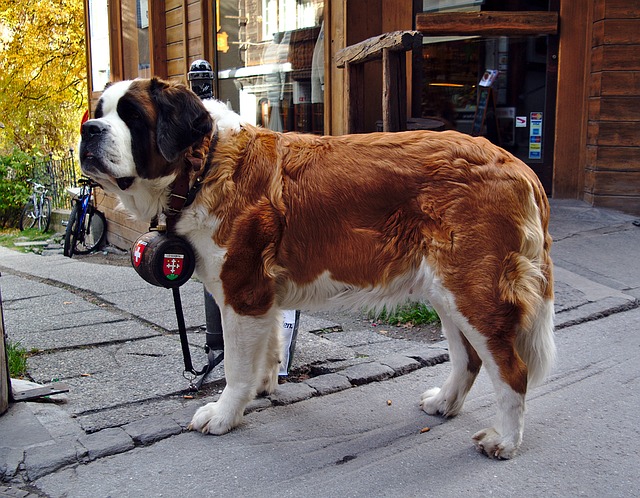
Both pros and cons to having a dog in times of a prolonged emergency can be argued. The more thoughtfully prepared you are for an emergency, the more likely you are to survive. Dogs and long-term emergencies can be challenging.
This preparation includes being ready to take care of any animals that you may own, whether livestock or pets. This article will be limited to discussing dogs and long-term emergencies.
In general, our lives are enriched by having a furry, four-legged member of the family. While dogs can certainly be of benefit to us during times of crisis, there are also some potential drawbacks as well. It is crucial to think about both the positive and the negative issues involved with having a dog in long-term emergencies. Being prepared is a major part of winning any battle.

First, We Will Look At Pros and Cons of Dogs and Long-Term Emergencies, In General
Being an optimist, I tend to see my glass as half full and to look at the positive side of things before looking at the negatives. There are several apparent positive aspects of having a dog during long-term emergencies.
Some of The Pros Are As Follows
Dogs are a type of alarm that requires no power source. Dogs of any size can warn you of impending danger and, often, scare them away. It only takes a very few seconds to make the difference needed to save a life. This warning can minimize the risk of theft or bodily injury to you, your family, or livestock.
- Defense goes hand in hand with the alarm system. Dogs are known to put their own lives at risk to defend and save their family. Several articles listed below share stories where dogs have been heroes. I think you would enjoy reading them as well.
- Guarding property, people, and livestock from predators of all kinds is another, related service dogs can provide. Breeds with a reputation for excelling as a guard dog are German Shepard, Rottweiler, Doberman Pinscher, Great Pyrenees, Great Dane, and Chow Chow.
- Hunting dogs can be of real value if you must hunt to put food on the table for your family.
- Tracking both humans and animals can be done by dogs of many breeds, but some are better at this than are others. One of our Saint Bernards had such a sensitive nose that she could not tolerate the smell of our sneakers to be mixed. When they were set out to dry haphazardly, she would set them in individual matched pairs. The kids always loved to play hide and seek when she was on their team!
- Pulling carts or carrying small packs is something nearly any dog can manage. Our Saint Bernards loved pulling sleds and carts and did so in several parades. Hiking with a dog carrying his water and food makes the trip easier. If you ever have to “bug-out” on foot, this could come in very handy.
- Warmth is something you might not immediately consider as a benefit. However, if you have no power and no one with whom to share body heat, a dog is an excellent source of warmth and comfort.
- Emotional support and companionship, especially for those living alone, are a vital part of survival. Dogs are great for boosting morale!
Some of the Cons of Having Dogs in Long-term Emergencies
They are dependent upon you for food, water, shelter, and medical care. Emergencies may compromise your ability to provide these things, but you are still responsible.
- Dogs need to be confined for their safety in either a kennel crate or a fenced-in yard as dogs running free in emergencies may be at serious risk.
- Fear of dogs can prevent dog owners from being allowed in many places. If this fear is excessive, it can lead to aggression towards your pet regardless of how loving he may be. Some breeds instill unreasonable fear in others without provocation. An article dealing with irrational fear is listed in the resource section below.
- Dogs can give you away if you are in hiding. Sometimes, drawing attention to oneself is the last thing you want or need to have happen. Even well-trained dogs can do this unintentionally.
- If you must evacuate, it may be challenging to find a place that accepts dogs. Whether shelters for families or groups of people banding together for safety, this may be a problem. Not all hotels will allow dogs even in emergencies such as natural disasters. (see the article on evacuation Cited below)
- Although they give unconditional love and emotional support, losing them is a devastating blow to your morale. When you are already stressed from a long-term emergency, this loss is felt even more strongly. There is no right time to lose a dear friend, furry or otherwise, but this is an exceptionally bad time for this to happen.
What Preparations Are Required For Dogs in Long-Term Emergencies?
- Water, food, and shelter are, of course, the most basic of the needs that must be met.
- Crate/kennel for times that confinement is required.
- A collar and leash is a necessary item to have on hand. A doggy back-pack to carry a small amount of food, water, and a collapsible bowl is ideal. Whether hiking for fun or when “bugging out” on foot, you will be glad to have these available.
- If your dog has chronic medical conditions requiring medication, you will need a supply of these meds on hand. Also, have a prescription for them in your document bag.
- Preventative medications such as Heart-Worm, De-wormers, and Flea prevention or treatment should be kept on hand. A supply of drugs for the treatment of any chronic medical problems should also be readily available. Ask your vet if Pyrantel Pamoate would be an appropriate option to have on hand for your dog. If your dog is likely to hunt a lot and eat some of the game, he may get tapeworms. A few breeds are more susceptible than others, so ask your vet if you need to prepare for this eventuality as well. If so, Panacur may be one of the less harsh choices to keep on hand. Again, ask your vet about this.
- Information regarding what vaccinations, when they were given, and by whom, should be kept with you. Many people have valuable information on all family members on a flash drive, as well as paper copies in a plastic bag.
- Basic grooming supplies are needed. Keeping a dog reasonably well-groomed can help keep them healthy. When vet attention is hard or impossible to obtain, prevention is better than treatment. If you live in an area where Lyme disease is common, you will want to read the article on Lyme disease and dogs mentioned in the Resource Section below. The basics include scissors, hand shears, brushes and combs, anti-fungal medications, and a basic Canine First Aid Kit.
- Depending on the climate and season of the emergency, there may be additional care to be taken. Common sense usually tells you what needs to be done, but you must first realize that climate and season must be considered. This need is also somewhat dependent upon the breed, age, and health of your dog.
Something All Dogs Need, Even Dogs in Long-Term Emergencies, Is Food
How much to feed and how best to store the food are the two most frequently asked questions regarding food. Many of the answers depend upon the individual dog and the length of time for which you wish to prepare. Keep in mind that dogs do better when there are no drastic changes in diet. If you must change from the food to which your dog is accustomed, try to transition slowly, if possible.
Dog Food Should Be Stored Like Human Food
Depending on the size of the dog, and how fast the food will be consumed, select a container of the appropriate size. It will need to be sealed to keep out air, bugs, mice, and anything that would eat it. Stored dog food needs to be kept dry and out of sunlight.
The use of diatomaceous earth and moisture absorbers will help the food to last longer. If you have a small dog, storing smaller, sealed bags of food in the container will work best. Larger dogs will go through the food faster, so you may not need to have smaller packets for them. The size of the container also determines the need for further packaging.
The bottom line is that you do not want to have a bag of dog food left open for long periods of time. If the amount of food stored in a container is more than you will use in a reasonable time, it needs smaller packaging. It is better to have several smaller packets inside the storage container than one large bag, and it go bad.
We stored food for our giant breed dogs in 55-gallon containers. Those with smaller breed dogs might do better with 5 lb vacuum sealed packets. The smaller bags allow the dog food to remain fresher and minimizes spoilage.
How Do I Know How Much Food I Need to Store for My Dog in Long-Term Emergencies?
There are tables of feeding guidelines recommended by various experts readily available on Google. PetMD is a reputable resource. Keep in mind that your dog’s age, size, exercise level, and general condition will determine his nutritional needs.
The quality of the food you have stored will also need to be considered. Food with high-fat content will not last as long as food with lower fat. Some of the more expensive dog food might not store well. Check out the ingredients carefully and be sure to avoid high sugar, high fat, corn, soy, or wheat in the food. Avoiding those elements helps to minimize the risk of exposure to Round Up in their food.
The article on obese dogs listed in the Resource Section below has reliable information on feeding guidelines. I recommend you check it out. Once you have calculated how much to feed your dog, it will be easier to determine how much to store for feeding your dog in long-term emergencies.
Don’t Be Fooled By Their Size
One of my sisters had a massive St. Bernard and a tiny poodle. The poodle was very energetic and had a high metabolic rate. She ate more than her giant canine companion on a daily basis. By comparison, we had several St. Bernards, and each one had their own metabolic rate that fit their activity levels. The more laid-back pups ate less than the ones with high energy levels unless they were pregnant or nursing.


In Summary, Dogs and Long-Term Emergencies Are Compatible, BUT, You Do Need to Prepare!
With some research and planning ahead, you and your canine companions can work together to make any emergency situation better. The unconditional love dogs give is enough to make the work of preparation worthwhile! When you consider the many practical ways dogs make your life better, the preparation for them is even more worthwhile.
Hopefully, there will never come a time where you will need to use all you have learned today. But, it is better to have the insurance of being prepared and not need it than to need it and not have it. Natural disasters cannot always be predicted, nor can events that lead to TEOTWAWKI. So, be like the Boy Scouts and “BE PREPARED.”
RESOURCE SECTION:
https://happymutt.org/1190-2/ What Happens to Dogs Post-Collapse?
https://excellentdogsclub.com/evacuated-what-do-you-do-with-your-pet/ Evacuated? What Do You Do With Your Pet?
https://happymutt.org/dog-on-a-diet-to-save-his-life/ Dog On A Diet To Save His Life
https://excellentdogsclub.com/lyme-disease-in-dogs/ Lyme Disease In Dogs
https://excellentdogsclub.com/watch-small-dogs-scare-off-big-bear-who-entered-their-backyard/ Watch: Small Dogs Scare Off Big Bear Who Entered Their Backyard
https://happymutt.org/affectionate-family-pet-or-aggressive-fighting-dog/ Affectionate Family Pet or Aggressive Fighting Dog?
https://excellentdogsclub.com/ways-to-protect-your-dogs-from-fleas/ Ways To Protect Your Dogs From Fleas
https://excellentdogsclub.com/effective-ways-to-prevent-fleas-from-affecting-dogs-and-puppies/ Effective Ways to Prevent Fleas From Affecting Dogs and Puppies







